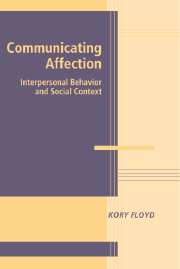Book contents
- Frontmatter
- Contents
- List of Tables
- List of Figures
- Foreword
- 1 AN INTRODUCTION TO AFFECTIONATE COMMUNICATION
- 2 THINKING ABOUT AFFECTION: THE THEORIES
- 3 ENCODING AFFECTIONATE MESSAGES
- 4 DECODING AND RESPONDING TO AFFECTIONATE EXPRESSIONS
- 5 BENEFITS OF EXPRESSING AND RECEIVING AFFECTION
- 6 RISKS ASSOCIATED WITH AFFECTIONATE COMMUNICATION
- 7 A NEW THEORETIC APPROACH
- 8 AFFECTIONATE COMMUNICATION IN HUMAN INTERACTION
- References
- Index
7 - A NEW THEORETIC APPROACH
Published online by Cambridge University Press: 02 December 2009
- Frontmatter
- Contents
- List of Tables
- List of Figures
- Foreword
- 1 AN INTRODUCTION TO AFFECTIONATE COMMUNICATION
- 2 THINKING ABOUT AFFECTION: THE THEORIES
- 3 ENCODING AFFECTIONATE MESSAGES
- 4 DECODING AND RESPONDING TO AFFECTIONATE EXPRESSIONS
- 5 BENEFITS OF EXPRESSING AND RECEIVING AFFECTION
- 6 RISKS ASSOCIATED WITH AFFECTIONATE COMMUNICATION
- 7 A NEW THEORETIC APPROACH
- 8 AFFECTIONATE COMMUNICATION IN HUMAN INTERACTION
- References
- Index
Summary
Don't be afraid of showing affection. Be warm and tender, thoughtful and affectionate. Men are more helped by sympathy than by service.
– Jean Baptiste LacordaireThere is no shortage of psychological and communicological theories on which to base studies about affectionate behavior. However, even a cursory analysis of the current body of research findings from the perspective of existing theories suggests some consequential holes in the breadth of our theoretic understanding. Perhaps the biggest reason for these deficits is that none of the theories detailed in Chapter 2 provides a comprehensive framework for understanding affectionate communication. Indeed, none of these theories was designed to do so, although some (e.g., somatosensory affectional deprivation theory) are obviously more closely focused on affection than others (e.g., politeness theory). A comprehensive framework is needed, however, both to account for myriad findings in the affectionate communication literature and to provide the level of theoretic sophistication necessary to advance the study of affectionate communication in realms where it will have direct applied benefit, such as in health or persuasion.
Several fundamental questions about affectionate communication were identified in the introductory chapter; these are among those that have received empirical attention thus far. Existing theories have been well suited to answering some of these fundamental questions but they have largely fallen short on others. This chapter begins with a short analysis of how extant theories fare, theoretically or empirically, in their abilities to explain and predict affectionate communication behavior.
- Type
- Chapter
- Information
- Communicating AffectionInterpersonal Behavior and Social Context, pp. 140 - 184Publisher: Cambridge University PressPrint publication year: 2006
- 1
- Cited by

